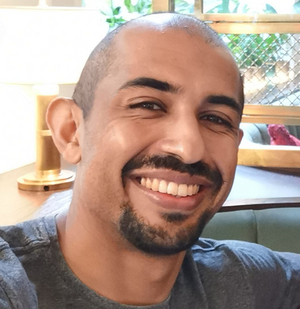George Viner Memorial Fund: Nabil Mehdinejad
It was a George Viner bursary which put Nabil Mehdinejad on the road to making award-winning journalist videos.

Nabil Medhinejad
© Private
Nabil Mehdinejad mixes a mean cocktail. His tequila-based Blood on the Leaves, with its secret beetroot powder ingredient, has won him kudos among exotic drink aficionados. But now he is being nominated for awards in another industry.
His video, The currency of culture, put him on the shortlist at the Royal Television Society's awards last month and he is up for Student Journalist of the Year at the Independent Radio News awards, winners will be announced tonight (15 July, 2021) . In 2019, his film Legitimising Inequity took first place at the London Student Film Festival.
It was thanks to the NUJ's George Viner Memorial Fund charity that he was able to start his career in journalism. It provided a bursary towards his Broadcasting Journalism MA which he studied at London's City University. It came about after he attended the NUJ's event, An Evening with Gary Younge, then with The Guardian.
Gary, now an NUJ Member of Honour and professor of sociology at the University of Manchester, was a hero of Nabil's for his writing in The Guardian and books on civil rights and race. Nabil said:
"Gary Younge said lots of encouraging things to me when I got chatting with him after he signed his book for me. I then got talking to BBC journalist, Saadeya Shamsuddin, who answered my questions about the George Viner scheme and encouraged me to apply."
Saadeya was a George Viner scholar in 2008 and has been a great supporter of the charity which was set up to broaden the diversity of journalists working in the British and Irish media. Nabil said:
"There was no way, I would be able to have taken this journey and access to journalism, without the support of the NUJ's George Viner bursary. For that I am always grateful. It has given me the opportunity to work towards my goals, despite my financial hardship, which would have prevented me from studying for my postgraduate qualification. The George Viner bursary has pivoted my life. I encourage everyone who feels they could benefit from support to apply and others to make a donation."
Nabil never imagined he would have ever been a journalist. He said: "I thought you had to be from Cambridge or Oxford universities. I'm also dyslexic and have other learning difficulties but I was always interested in storytelling and even as a young teen I would be in the school library reading the papers and current affairs publications like The Economist."
He went to school at St George's in west London soon after its headteacher Philip Lawrence had been stabbed to death protecting a pupil outside the school gates. The school went into a spiral of decline and after being failed by the watchdog Ofsted, Lady Marie Stubbs was brought in to turn it around. Lady Stubbs invited celebrities to the school – Kevin Keegan, Ralph Fiennes, Cherie Booth and Frank Bruno – to give students positive role models and Nabil found himself showing Prime Minister Tony Blair's wife around the school and he was given the opportunity to interview her.
He also took part in a leadership and development programme run by Leroy Logan, the founding member of the Black Police Association and who was involved in the Stephen Lawrence Inquiry and the inquiry into the killing of Damilola Taylor. Nabil had had some bad experiences with the police, being stopped and searched many times growing up near Kilburn, west London.
But his real hero is his mother who was born in Lahore who, since he was aged 10, brought him and his sister up after splitting up from his father, who had come to the UK as a refugee from Iran. She encouraged him to take part in after school clubs, music lessons and she took them to museums. In his video The currency of culture he makes the case for the less well off who lose out on the social skills provided by having a rich cultural life.
After leaving school Nabil landed into the hospitality industry, working for two years at The Savoy and in a number of Michelin-star restaurants. He took a part-time job with the Royal Mail so he could complete his undergraduate degree at University of London's Birkbeck college, but it was the final year module in journalism and conflict that interested him most.
He was immediately struck by the fact many of the students at City University did not share a background like his. He said:
"People said I sounded like Ali G. But I soon got into the course, benefited from having such excellent teachers, for example journalism ethics was taught by the investigative journalist Paul Lashmar, and was able to express my kind of journalism."
It hasn't been ideal taking his journalism masters during the pandemic, but he has had plenty of work experience, shifts with Sky News and ITN among others, and had "heaps" of interviews. His ambition now is to be a producer in the newsroom, maybe on the foreign desk, to uncover injustices and fight for a fairer society.
Apply for a George Viner bursary
Michelle Stanistreet, NUJ general secretary, said:
"The charity was set up to broaden the diversity of journalists working in the British and Irish media and has been the backbone of the NUJ's work to put its collective commitment to diversity and representation into practice. It remains vital work.
"Latest figures from the National Council for the Training of Journalists show that our newsrooms comprise 92 per cent journalists from white ethnic groups. So much more needs to be done to encourage journalism students from a greater range of backgrounds."
Find out more about the George Viner Memorial Fund.
